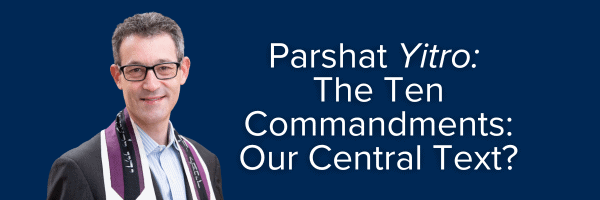If you come to Shabbat morning services this weekend, wear good shoes, because when the Ten Commandments are read from the Torah scroll, we will stand for the entire reading. Why? Like so many other Jewish traditions, standing for the Decalogue has been controversial since it began hundreds of years ago.
The rabbis who dealt with this question were weighing two opposing interests: showing appropriate respect for these central, overarching commandments in Judaism, and, on the other hand, avoiding emphasis of any one teaching to the exclusion of the others. In fact, there is a specific prohibition in the Talmud against elevating the Ten Commandments over any other part of the Torah. Until the Mishnaic period (around 200 CE), the Decalogue was recited every day as part of the Jewish prayers. It was removed (and eventually, some believe, replaced by the Shema and V’ahavta) to prevent us from believing that those ten laws were enough, and we didn’t have to bother with the rest.
One of the hardest courses I’ve ever had to teach is called “The Basic Beliefs of Judaism.” While some religions have a set of five or more main tenets, Judaism feels harder to pin down. Which texts should one choose? Which commandments best represent what Judaism is all about? We often tell the story of Rabbi Hillel, who, when asked to sum up Torah on one foot, responded with his interpretation of the commandment to love your neighbor as yourself: “What is hateful to you, do not do to your neighbor.” However, Hillel’s learned rival, Shammai, responded to the same question differently – he chased the questioner away, refusing to sum up an entire religion just to save time. While we usually favor Hillel’s response in telling this story, Shammai’s answer is instructive here.
Judaism’s lack of a central doctrine is frustrating for some. But for others, including many who study with me for conversion, it is one of the things that draw them in. If someone asked you what the fundamental story of Judaism is, what would you say? Creation? Abraham’s covenant with God and journey from home to Canaan? The experience of slavery and liberation? The destruction of the Temple and dispersion as refugees into many different lands? For so many reasons, I am glad we don’t have to choose. No matter what we are facing in our lives, no matter what the big questions are of the moment, we can find them reflected in Torah, our living revelation and ongoing search for answers.
Wishing you a Shabbat Shalom,
Rabbi Jeff Saxe


